兴隆中学高2014级半期考试英语试题
高中英语真题-2014届高三上学期期中考试英语试卷
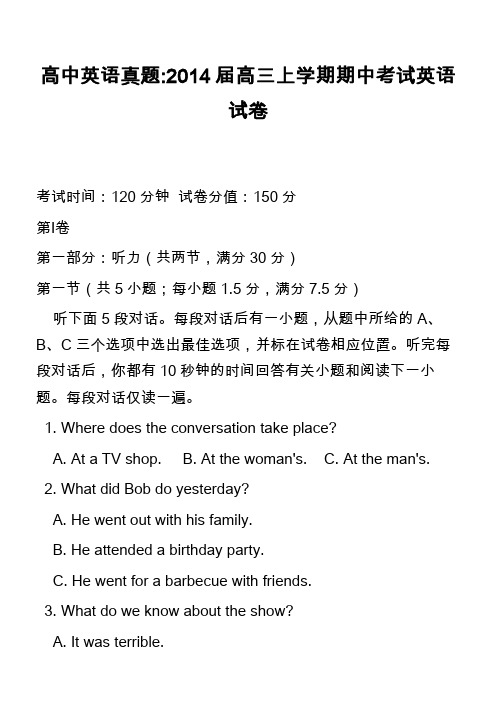
高中英语真题:2014届高三上学期期中考试英语试卷考试时间:120分钟试卷分值:150分第Ⅰ卷第一部分:听力(共两节,满分30分)第一节(共5小题;每小题1.5分,满分7.5分)听下面5段对话。
每段对话后有一小题,从题中所给的A、B、C三个选项中选出最佳选项,并标在试卷相应位置。
听完每段对话后,你都有10秒钟的时间回答有关小题和阅读下一小题。
每段对话仅读一遍。
1. Where does the conversation take place?A. At a TV shop.B. At the woman's.C. At the man's.2. What did Bob do yesterday?A. He went out with his family.B. He attended a birthday party.C. He went for a barbecue with friends.3. What do we know about the show?A. It was terrible.B. It was not different from other shows.C. It was a festival show.4. What does the woman mean?A. The man should start running daily.B. It's important to warm up before exercising.C. The man should continue his exercise program.5. When must the book reports be handed in?A. Not later that November 13.B. Not earlier than November 13.C. 0n November 30.第二节(共15小题;每小题1.5分,满分22.5分)听下面5段对话或独白。
14—15学年上学期高一期中考试英语试题(附答案)

承德八中2014---2015学年第一学期高一期中考试英语试题第Ⅰ卷第一部分听力(共两节,满分30分)第一节(共5个小题:每小题1.5分,满分7.5分)听下面5段对话。
每段对话后有一道小题,从每题所给的A B C三个选项中选出最佳选项,并标在试卷的相应位置。
听完每段对话后,你都有10秒钟的时间来回答有关小题和阅读下一小题。
每段对话仅读一遍。
1. Where does the conversation most probably take place?A. In a park.B. In a zoo.C. In a pet store.2. What does the woman mean?A. Things here are very cheap.B. Things here are not cheap.C. She doesn’t know whether things here are cheapor not.3. Where are the two speakers going to plant the tree?A. By the front door.B. At the back of the garage.C. At the end of the garden.4. Where does the conversation take place?A. In a shop.B. In a hotel.C. In a restaurant.5. What do we learn from the conversation?A. The man went to New Zealand during Christmas.B. The man visited New Zealand during the summer holiday.C. The man’s parents live in New Zealand.第二节(共15小题:每小题1.5分,满分22.5分)听下面5段对话或对白,每段对话或对白后有几个小题,从题中所给的A、B、C三个选项中选出最佳选项,并标在试卷的相应位置,听每段对话或独白前,你将有时间阅读各个小题。
高中英语真题-2014学年第二学期高二年级普通班期中考试试卷
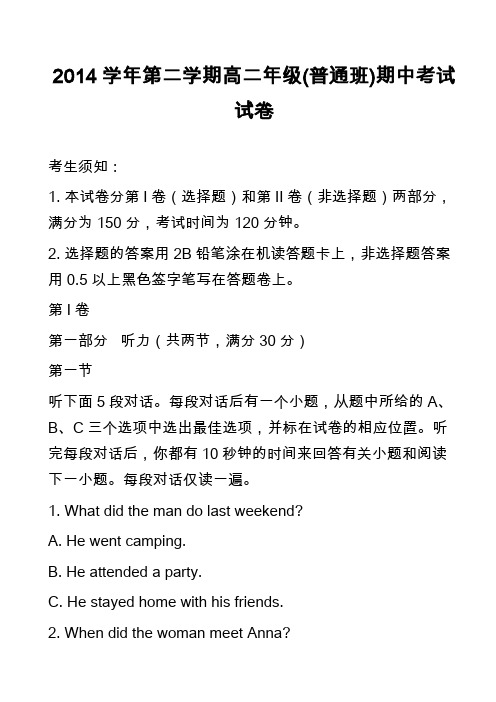
2014学年第二学期高二年级(普通班)期中考试试卷考生须知:1. 本试卷分第I卷(选择题)和第II卷(非选择题)两部分,满分为150分,考试时间为120分钟。
2. 选择题的答案用2B铅笔涂在机读答题卡上,非选择题答案用0.5以上黑色签字笔写在答题卷上。
第I卷第一部分听力(共两节,满分30分)第一节听下面5段对话。
每段对话后有一个小题,从题中所给的A、B、C三个选项中选出最佳选项,并标在试卷的相应位置。
听完每段对话后,你都有10秒钟的时间来回答有关小题和阅读下一小题。
每段对话仅读一遍。
1. What did the man do last weekend?A. He went camping.B. He attended a party.C. He stayed home with his friends.2. When did the woman meet Anna?A. At 7:55.B. At 7:58.C. At 8:02.3. Why does the woman remember James so well?A. He has a funny face.B. He was the first person she met at school.C. He was late for school on the first day.4. What do we know about the man?A. He is eager to meet the boss.B. He is going to give a talk on fishing.C. He has the same hobby as the boss.5. What does the woman mean?A. Bob never studies hard.B. Bob has been studying hard lately.C. Bob started preparing for the test long ago.第二节听下面5段对话或独白。
高中英语真题-2013—2014学年高一下学期期中检测

高中英语真题:2013—2014学年高一下学期期中检测第一部分听力测试(共两节,20小题,每小题1.5分,满分30分)听下面5段对话。
每段对话仅读一遍。
1. What can we know about the woman?A. She had to work overtime.B. She failed to see Henry.C. She had a traffic accident.2. What does the man mean?A. He wonders why the woman is here.B. He himself is Dr Johnson.C. The doctor will be here soon.3. What is the man?A.reporter. B. A patient. C. A scie ntist.4. Where does the conversation take place?A. At a restaurant.B. In a classroom.C. In a shop.5. How will the two speakers go to ?A. By car.B. By air.C. By train.听下面5段对话或独白。
每段对话或独白读两遍。
请听第6段材料,回答第6、7题。
6. Why are Mondays terrible for the man?A. He doesn’t want to work after the weekend.B. Monday is full of difficult lessons for him.C. Monday means the beginning of a whole week.7. What subjects does the man seem to like?A. Art and Music.B. English and Maths.C. Geography and Maths.请听第7段材料,回答第8至10题。
高中英语真题-“六校联考”高2014级第一学期期中试题

高中英语真题:“六校联考”高2014级第一学期期中试题(全卷满分:150分完成时间:120分钟)第Ⅰ卷(选择题满分100分)第一部分听力(共两节,满分30分)第一节(共5小题;每小题1.5分,满分7.5分)听下面5段对话。
每段对话后有一个小题,从题中所给的A、B、C三个选项中选出最佳选项,并标在试卷的相应位置。
每段对话仅读一遍。
1.What do the speakers need to buy?A.A fridge. B.A dinner table. C.A few chairs. 2.Where are the speakers?A.In a restaurant.B.In a hotel. C.In a school. 3.What does the woman mean?A.Cathy will be at the party.B.Cathy is too busy to come.C.Cathy is going to be invited.4.Why does the woman plan to go to town?A.To pay her bills in the bank.B.To buy books in a bookstore.C.To get some money from the bank.5.What is the woman trying to do?A.Finish some writing. B.Print an article.C.Find a newspaper.第二节(共15小题;每题1.5分,满分22.5分)听下面5段对话或独白。
每段对话或独白后有几个小题,从题中所给的A,B,C三个选项中选出最佳选项,并标在试卷的相应位置。
每段对话或独白读两遍。
听第6段材料,回答第6、7题。
6.What is the man doing?A.Changing seats on the plane.B.Asking for a window seat.C.Trying to find his seat.7.What is the woman’s seat number?A.6A. B.7A. C.8A.听第7段材料,回答第8、9题。
高中英语真题-2013-2014学年度第一学期高二年级期中考试英语试卷
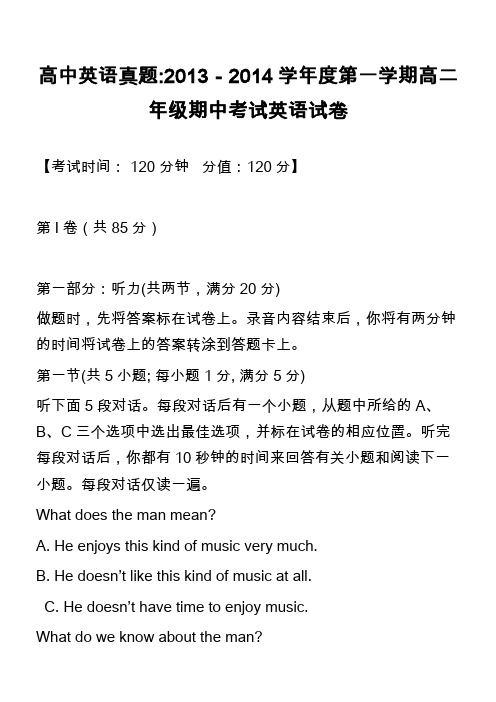
高中英语真题:2013-2014学年度第一学期高二年级期中考试英语试卷【考试时间: 120 分钟分值:120分】第I卷(共85分)第一部分:听力(共两节,满分20分)做题时,先将答案标在试卷上。
录音内容结束后,你将有两分钟的时间将试卷上的答案转涂到答题卡上。
第一节(共5小题; 每小题1分, 满分5分)听下面5段对话。
每段对话后有一个小题,从题中所给的A、B、C三个选项中选出最佳选项,并标在试卷的相应位置。
听完每段对话后,你都有10秒钟的时间来回答有关小题和阅读下一小题。
每段对话仅读一遍。
What does the man mean?A. He enjoys this kind of music very much.B. He doesn’t like this kind of music at all.C. He doesn’t have time to enjoy music.What do we know about the man?A. He lost his keys.B. He lost his way.C. He lost his car .Where does the conversation most probably take place?A. In a library.B. In a bookstore.C. In a reading room.4. What are the woman’s two daughters like?A. Nancy is older and taller.B. Nancy’s sister is older and taller.C. Nancy’s sister is taller though younger.5. What does the woman think of the man’s being on a diet?A. I t’s a foolish action.B. It helps to lose weight.C. It will make one feel weak.第二节(共15小题;每小题1分,满分15分)请听下面5段对话或独白。
高中英语真题-2014届高三英语上学期期中试题新人教版_5

高中英语真题:2014届高三英语上学期期中试题新人教版第一卷第一部分听力(共两节,满分30分)第一节(共5小题:每小题I.5分,满分7.5分)听下面5段对话。
每段对话后有一个小题,从题中所给的A、B、C三个选项中选出最佳选项。
1. What did the man mean?A. He quite agreed with the woman.B. He enjoyed the lecture the whole time.C. The lecture was more than one hour long.2. How much did the woman pay for the cap?A. Ten dollars.B. Forty dollars.C. Fifty dollars.3. Where is the man going to plant the tree?A. By the front door.B. At the back of the garage.C. At the other end of the garden.4. What does the man really want to do?A. To read the advertisement.B. To meet the manager.C. To take the job.5. What's the time now?A. 8: 30.B. 8: 00.C. 9: 00.第二节(共15小题:每小题1.5分,满分22.5分)听下面5段对话或独白。
每段对话或独白后有几个小题,从题中所给的A、B、C三个选项中选出最佳选项。
听第6段材料,回答第6至7题。
6. Where is the People's Park?A. At the third crossing.B. At the end of the road.C. Opposite a school.7. How is the man going there?A. On footB. By busC. By car听第 7 段材料,回答第 8-10 题。
高中英语真题-2014学年度第二学期高二年级英语学科期中考试卷
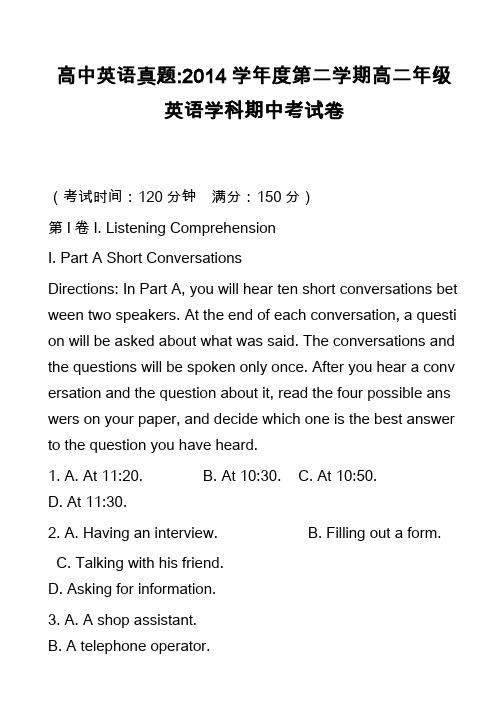
高中英语真题:2014学年度第二学期高二年级英语学科期中考试卷(考试时间:120分钟满分:150分)第I卷I. Listening ComprehensionI. Part A Short ConversationsDirections: In Part A, you will hear ten short conversations bet ween two speakers. At the end of each conversation, a questi on will be asked about what was said. The conversations and the questions will be spoken only once. After you hear a conv ersation and the question about it, read the four possible ans wers on your paper, and decide which one is the best answer to the question you have heard.1. A. At 11:20. B. At 10:30. C. At 10:50.D. At 11:30.2. A. Having an interview. B. Filling out a form.C. Talking with his friend.D. Asking for information.3. A. A shop assistant.B. A telephone operator.C. A waitress.D. A clerk.4. A. At home. B. In an office.C. In a car.D. On the street.5. A. A railway porter.B. A telephone operator.C. A bus conductor.D. A postal clerk.6. A. A father and a son. B. A teacher and his s tudent.C. A student and his classmate.D. A librarian and a st udent.7. A. A movie. B. A lecture. C. A play.D. A speech.8. A. The man won’t become a superstar.B. The man has no gift for table tennis.C. The man should find a new partner.D. The man should not give up.9. A. His injury kept him at home.B. He didn’t consider it necessary.C. He was too weak to see the doctor.D. He failed to make an appointment.10. A. He wants to get a new position.B. He is asking the woman for help.C. He has left the woman a good impression.D. He enjoys letter writing.Part B PassagesDirections: In Part B, you will hear two short passages, and yo u will be asked three questions on each of the passages. The passages will be read twice, but the questions will be spoken only once. When you hear a question, read the four possible answers on your paper and decide which one would be the be st answer to the question you have heard.Questions 11 through 13 are based on the following passage.11. A. On Tuesdays and Wednesdays.B. On Tuesdays and Thursdays.C. On Wednesdays and Thursdays.D. On Tuesdays and Fridays.12. A. Once a week.B. Twice a week.C. Once a month.D. Twice a month.13. A. Classroom tests.B. Attendance rate.C. Research papers.D. Final exam.Questions 14 through 16 are based on the following passage.14. A. Photographs. B. Books. C. Films.D. Music.15. A. Poverty. B. Disasters.C. Racial injustice.D. Crime.16. A. He was the first director of .B. He lived a poor life in his childhood.C. He was born in Middle Eastern Africa.D. He picked up photography in 1912.Part C Longer ConversationsDirections: In Part C, you will hear two longer conversations. The conversations will be read twice. After you hear each con versation, you are required to fill in the numbered blanks with the information you have heard. Write your answers on your a nswer sheet.Blanks 17 through 20 are based on the following conversation .Complete the form. Write ONE WORD for each answer.Blanks 21 through 24 are based on the following conversation .Complete the form. Write NO MORE THAN THREE WORDS for each answer.II. GrammarDirections: After reading the passages below, fill in the blanksto make the passages coherent and grammatically correct. F or the blanks with a given word, fill in each blank with the prop er form of the given word; for the other blanks, use one word t hat best fits each blank.(A)When you start talking about good and bad manners, you im mediately start meeting difficulties. Many people just cannot a gree with what they mean. We asked a lady, who replied that she thought you could judge a well-mannered person 25. the way they occupied the space ar ound them --- for example, when such a person walks down a street, he or she is constantly aware of 26.______. Such people never bu mp into other people.However, a second person thought that this was more a quest ion of civilized behavior 27.______ good manners. Instead, thi s other person told us a story, 28.______ he said was quite we ll known, about an American who 29.______ (invite) to an Ara b meal in one of the countries of the Middle East. The Americ an hadn’t been told very much about the kind of food he might expect. If he had known about Arab food, he might have beh aved better.Immediately before him was a very flat piece of bread that looked, to him, very much like a napkin. Picking it up, he put it int o his collar, 30.______ _______it fell across his shirt. His Arab host, who had been watching, 31.______ (say) nothing, but i mmediately copied the action of his guest.And that, said this second person, 32.______ (be)a fine exam ple of good manners.(B)Over the last 25 years, British society has changed a great de al--- or at least many parts of it have. In some ways, 33.______, v ery little has changed, particularly where attitudes are concern ed. Ideas about social class --- 34.______ a person is “working-class” or “middle-class” --- are one area in which changes have been extremely slow.In the past, the working-class tended 35.______ (pay) less than middle-class people, such as teachers and doctors. As a result of this and also of the fact 36.______ work ers’ jobs were generally m uch less secure, distinct differences in life-styles and attitudes came into existence. The typical working man would collect his wages on Friday evening and then, 37. ______ (give) his wife her “housekeeping”, would go out and s pend the rest on beer and betting.The stereotype of 38.______ a middle-class man did with his money was perhaps nearer the truth. H e was --- and still is --- likely to take a longer-term view. Not only 39.______ he regard buying a house as a top priority, but he also considered the education of his childre n as extremely important. Both of these provide him and his fa mily with security. Only in very few cases did workers have th e opportunity (or the education and training) 40.______ (make) such long-term plans.Vocabulary(10分)Directions: Complete the following passage by using the word s in the box. Each word can only be used once. Note that ther e is one word more than you need.A.partly B.satisfy C.place D.familiarE.understanding F.collected G.honoring H.roleI.improved J.strict K. likelyArt museums are places where people can learn about variou s cultures. The increasingly popular “design museums” that ar e opening today, however, perform quite a different __41__. U nlike most art museums, the design museum shows objects t hat are easily found by the general public. These museums sometimes even __42___ things like fridges and washing mach ines in the center of the hall.People have argued that design museums are often made us e of as advertisements for new industrial technology. But their role is not simply a matter of sales--it is the ___43___ of excellently invented products. The differe nce between the window of a department store and the showc ase in a design museum is that the first tries to sell you somet hing, while the second tells you the success of a sale.One advantage of design museums is that they are places wh ere people feel __44___ with the exhibits. Unlike the average art museum visitors, design museum visitors seldom feel frigh tened or puzzled. This is __45__ because design museums cl early show how and why mass-produced products work and look as they do, and how design has __46__ the quality of our lives. Art museum exhibits, on th e other hand, would most probably fill visitors with a feeling th at there is something beyond their __47__.In recent years, several new design museums have opened t heir doors. Each of these museums has tried to __48__ the pu blic’s growing interest in the field with new ideas. London’s , f or example, shows a collection of mass-produced objects from Zippo lighters to electric typewriters toa group of Italian fish-tins. The choices open to design museums seem far less __4 9__ than those to art museums, and visitors may also sense t he humorous part of our society while walking around such ex hibits as interesting and unusually attractive toys ___50___ in our everyday life .IV. Reading ComprehensionSection ADirections: For each blank in the following passage there are f our words or phrases marked A, B, C and D. Fill in each blank with the word or phrase that best fits the context.Success often depends on your performance at an interview. For those who are well prepared, it can be a 51 experience but for others it can be a 52 time. Love them or hate them, t hough, your job prospects are largely dependent on your inter view 53 . It’s not unusual for a company to have fifty or sixty applicants, for a job, so if you are asked to attend a(n) 54 , y ou are a serious competitor being seriously 55 for the post. Usually companies give you at least a day’s notice of an inter view, so use that time to 56 yourself well. Read through the job description and any information sent to you, and prepare answers to as many questions as you can 57 .At an interview, try to present a “ 58 ” version of yourself. Yo u need to 59 the employer that you can do the job, 60 yo u mustn’t appear over-confident. Being pleasant, however, doesn’t mean that you sh ould 61 with everything that the interviewer says. Most com panies want to elect someone with his or her own 62 .It’s also important to make sure that you really listen to what i s being asked. In your preparation you will have rehearsed an swers to a number of imaginary questions; but you must 63 your response to suit the questions.It’s worthwhile spending a few moments after the interview 6 4 your performance. You can do this best before you know t he 65 . What aspects of the interview went well? What do y ou need to improve? What would you do differently next time?51. A. common B. positive C. first-hand D. discouraging52. A. terrifying B. agreeable C. appointedD. convenient53. A. skills B. craft C. efficiencyD. qualifications54. A. occasion B. situation C. interview D. ceremony55. A. trained B. wanted C. appliedD. considered56. A. decorate B. shape C. dressD. prepare57. A. worry about B. think of C. refer toD. ask for58. A. pleasant B. modern C. dramaticD. formal59. A. confirm B. prove C. convinceD. guarantee60. A. then B. and C. butD. therefore61. A. deal B. agree C. compareD. discuss62. A. opinion B. belief C. characterD. personality63. A. give B. shift C. find D. tailor64. A. conducting B. attending C. analyzingD. directing65. A. performance B. result C. interviewD. positionSection BDirections: Read the following passages. Each passage is foll owed by several questions. For each of them there are four c hoices marked A,B,C and D. Choose the one that fits best acc ording to the information given in the passage you have just r ead.AThe morning had been a disaster. My tooth was aching, and I’d been in an argument with a friend. Her words still hurt:“The trouble with you is that you won’t put yourself in my plac e. Can’t you see things from my point of view?” I shook my he ad stubbornly—and felt the ache in my tooth. I’d thought I could hold out till m y dentist came back from holiday, but the pain was really unb earable. I started calling the dentists in the phonebook, but no one could see me immediately. Finally, at about lunch time, I got lucky.“If you come by right now,” the receptionist said, “the dentist w ill fit you in .”I look my purse and keys and rushed to my car. But suddenlyI began to doubt about the dentist. What kind of dentist would be so eager to treat someone at such short notice? Why wasn ’t he as busy as the others?In the dentist’s office, I sat down and looked around. I saw not hing but the bare walls and I became even more worried. The assistant noticed my nervousness and placed her warm hand over my ice-cold one.When I told her my fears, she laughed and said ,“Don’t worry. The dentist is very good.”“How long do I have to wait for him? ”I asked impatiently.“Come on, he is coming. Just lie down and relax. And enjoy th e artwork,” the assistant said.“The artwork?” I was puzzled.The chair went back, suddenly I smiled. There was a beautiful picture, right where I could enjoy it, on the ceiling. How consi derate the dentist was! At that moment, I began to understand what my friend meant by her words.What a relief!66. Which of the following best describes the author’s feeling t hat morning?A. Cheerful.B. Nervous.C. Satisfied.D. Upset.67. What made the author begin to doubt about the dentist?A. The dentist’s agreeing to treat her at very short notice.B. The dentist’s being as busy as the other dentists.C. The surroundings of the dentist’s office.D. The laughing assistant of the dentist.68. Why did the author suddenly smile?A. Because the dentist came at last.B. Because she saw a picture on the ceiling.C. Because she could relax in the chair.D. Because the assistant kept comforting her.69. What did the author learn from her experience most proba bly?A. Strike while the iron is hot.B. Have a good word for one’s friendC. Put oneself in other’s shoesD. A friend in need is a friend indeed.B70. The phrase “a gra nt” in the first line most probably means _____.A. bank interestB. a credit cardC. an education feeD. financial aid71. A student from Japan who has been studying in for a yea r and intends togo to college in a few months will _____.be unable to get money from any LEAget money if taking a first degree courseget money from LEA when finishing his coursehave to open a bank account before getting money72. A 31-year-old nurse wishes to qualify as a doctor at a university. She ha s workedsince she was 25. How much extra money will she get a year ?None. B. £155. C. £615.D. £515.73. A big bank offers a new student special services because _____.A. they need student accounts badlyB. they charge students extra interestC. they know he can get money regularlyD. they hope he’ll be a potential customerCPublicity(宣传) offers several benefits. There are not costs for message ti me or space. An ad in prime-time television may cost $250,000 to $5,000,000 or more per minute, whereas a five-minute report on a network newscast would not cost anything. Publicity reaches a mass audience within a short time and ne w products or company policies are widely known.Credibility about messages is high, because they are reported in independent media. A newspaper review of a movie has more believability than an ad in the same paper, because the re ader associates independence with objectivity. Similarly, peop le are more likely to pay attention to news reports than to ads. For example, Women’s Wear Daily has both fashion reports and advertisements. Readers spend time reading the stories, but they skim through the ads. Furthermore, there may be 10 commercials during a half-hour television program or hundreds of ads in a magazine. Fe ature stories are much fewer in number and stand out clearly.Publicity also has some significant limitations. A firm has little control over messages, their timing, their placement, or their c overage by a given medium. It may issue detailed news relea ses and find only portions mentioned by the media, and medi a have the ability to be much more critical than a firm would li ke.For example, in 1982, Procter & Gamble faced a massiv e publicity problem over the meaning of its 123-year-old company logo. To fight this negative publicity, the firm had a spokesperson appear on Good Morning America to disprov e the rumor(谣言). The false rumors were temporarily put to rest. However, in 1985, publicity became so troublemaking that Procter & Gamble decided to remove the logo from its products.A firm may want publicity during certain periods, such as whe n a new product is introduced or new store opened, but the m edia may not cover the introduction or opening until after the ti me it would aid the firm. Similarly, media determine the place ment of a story; it may follow a report on crime or sports. Final ly, the media decide whether to cover a story at all and the a mount of coverage to be devoted to it.74. All of the following advantages of publicity are mentioned EXCEPT _____.A. time savingB. attentivenessC. credibilityD. profitability75. Compared with ad, news report or featuring stories are m ore _____.A. believableB. clearC. dependentD. subjective76. The example of “Procter & G amble” is given to show ____ _.A. the efficient way of disproving rumorsB. the importance of a spokespersonC. the interaction between firms and mediaD. the negative effect of publicity77. What’s the author’s attitude towards publicity?A. doubtfulB. objectiveC. passiveD. supportiveSection CDirections: Read the passage carefully. Then answer the que stions or complete the statements in the fewest possible word s.The motor vehicle has killed and disabled more people in its b rief history than any bomb or weapon ever invented. Much of t he blood on the street flows essentially from uncivil behavior o f drivers who refuse to respect the legal or moral rights of othe rs. So the massacre(屠杀)on the road may be regarded as a social problem.In fact, the enemies of society on wheels are rather harmless people just ordinary people acting carelessly, you might say. But it is a principle both of law and common morality that carel essness is no excuse when one’s actions could bring death or damages to others. A minority of the killers go even beyond carelessness to total negligence.Researchers have estimated that as many as 80 percent of all automobile accidents can be connected with psychological c ondition of the driver. Emotional upsets can affect drivers’ rea ctions, slow their judgment, and blind them to dangers that mi ght otherwise be evident. The experts warn that it is vital for e very driver to make a conscious effort to keep one’s emotions under control.Yet the irresponsibility that accounts for much of the problem i s not limited to drivers. Street walkers regularly ignore traffic r egulations. They are at fault in most vehicle walker accidents; and many cyclists even believe that they are not subject to th e basic rules of the road.In the past few years, safety standards for vehicle have been raised both at the point of manufacture and through periodic r oad-worthiness inspections. In addition, speed limits have been lo wered. Due to these measures, the accident rate has decreas ed. But the accident experts still worry because there has bee n little or no improvement in the way drivers behave. The onlyreal and lasting solution, say the experts, is to convince peopl e that driving is a skilled task requiring constant care and con centration. Those who fail to do all these things present a thre at to those with whom they share the road.(Note: Answer the questions or complete the statements in N O MORE THAN TEN WORDS.)78. Why road killers can’t be excused?Because __________.79. In order to avoid automobile accidents, the experts sugge st drivers should __________.80. Besides drivers, who should also be blamed for most road s accidents?81. The accident rate has decreased in the past few years be cause of __________.第II卷I. TranslationDirections: Translate the following sentences into English, usi ng the words given in the brackets.他总是不懂装懂。
2014级高二下期半期考试英语半期试卷及答案

成都七中高2014级高二(下)半期考试英语本试卷分第一卷(选择题)和第二卷(非选择题)两部分。
满分150分,考试时间120分钟。
第一卷(共110分)第一部分听力(共两节,满分30分)第一节(共5小题;每小题l. 5分,满分7.5分)听下面5段对话。
每段对话后有一个小题,从题中所给的A、B、C三个选项中选出最佳选项,并标在试卷的相应位置。
听完每段对话后,你都有l0秒钟的时间来回答有关小题和阅读下一小题。
每段对话仅读一遍。
例:Howmuch is the shirt?A£19.15.B£9.15. C£9.18.答案是B。
1. WhatwillDorothydo ontheweekend?A. Gooutwith herfriend.B. Work on herpaper.C. Make some plans.2. Whatwasthe normal price ofthe T-shirt?A. $15.B. $30.C. $50.3. What has the woman decided to do on Sunday afternoon?A. To attend a wedding.B. To visit an exhibition.C. Tomeetafriend.4. When doesthe bankclose on Saturday?A. Atl:00 pm.B. At 3:00 pm.C. At 4:00 pm.5. Where are the speakers?A. In a store.B. In a classroom.C. At a hotel.第二节(共15小题;每小题1. 5分,满分22 .5分)听下面5段对话或独自。
每段对话或独自后有几个小题,从题中所给的A、B、C三个选项中选出最佳选项,并标在试卷的相应位置。
听每段对话或独白前,你将有时间阅读各个小题,每小题5秒钟;听完后,各小题给出5秒钟的作答时间。
高中英语真题-2014学年第一学期高二年级期中考试英语试题

高中英语真题:2014学年第一学期高二年级期中考试英语试题本试卷分第一卷(选择题)和第二卷(非选择题)两部分,共100分,考试时间90分钟。
第I卷(共65分)I:听力(满分15分)第一节(共5小题,每小题1分,满分5分)听下面5段对话。
每段对话后有一个小题,从题中所给的A、B、C三个选项中选出最佳选项,并标在试卷的相应位置。
听完每段对话后,你都有10秒钟的时间来回答有关小题和阅读下一小题。
每段对话仅读一遍。
1. What color is the shirt?A. Yellow.B. Green.C. Blue.2. How much does the woman weigh?A. 150 pounds.B. 153 pounds.C. 170 pounds.3. What does the woman find about advertisements?A. Reliable.B. Helpful.C. Misleading.4. Where will the family probably go for a holiday?A. To the Expo.B. To Hainan.C. To .5. Why does the woman plan to go to the town?A. To get some money from the bank.B. To buy books in a bookstore.C. To pay her bill in the bank.第二节(共10小题,每小题1分,满分10分)听下面3段对话或独白。
每段对话或独白后有几个小题,从题中所给的A、B、C三个选项中选出最佳选项,并标在试卷的相应位置。
听每段对话或独白前,你将有时间阅读各个小题,每小题5秒钟;听完后,各小题将给出5秒钟的作答时间。
每段对话或独白读两遍。
听第6段材料,回答第6至8题。
6. What is the advantage of the man’s vegetables?A. They are grown with good chemical fertilizer.B. They are safe to eat.C. They look green.7. What does the woman think of the vegetables?A. They are too expensive.B. They are too green.C. They are overgrown.8. What will the woman do?A. She won’t buy the vegetables.B. She will buy the vegetables this time.C. She will buy the vegetables next week.听第7段材料,回答第9至11题。
14八上半期考试题(含答案)
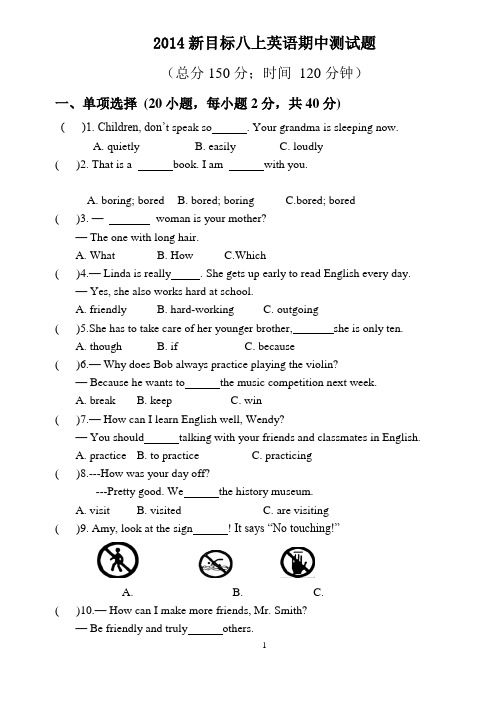
2014新目标八上英语期中测试题(总分150分;时间120分钟)一、单项选择(20小题,每小题2分,共40分)( )1. Children, don’t speak so . Your grandma is sleeping now.A. quietlyB. easilyC. loudly( )2. That is a book. I am with you.A. boring; boredB. bored; boringC.bored; bored( )3. —woman is your mother?— The one with long hair.A. WhatB. HowC.Which( )4.— Linda is really . She gets up early to read English every day.— Yes, she also works hard at school.A. friendlyB. hard-workingC. outgoing( )5.She has to take care of her younger brother, she is only ten.A. thoughB. ifC. because( )6.— Why does Bob always practice playing the violin?— Because he wants to the music competition next week.A. breakB. keepC. win( )7.— How can I learn English well, Wendy?— You should talking with your friends and classmates in English.A. practiceB. to practiceC. practicing( )8.---How was your day off?---Pretty good. We the history museum.A. visitB. visitedC. are visiting( )9. Amy, look at the sign ! It says “No touching!”A. B. C.( )10.— How can I make more friends, Mr. Smith?— Be friendly and truly others.A. care aboutB. bring outC. feel like( )11. I am fifteen now and I am as as my father.A. olderB. oldC.tall( )12. Pan Changjiang is than Zhao Benshan, but they are both .A. faster; funnierB. shorter; funnyC. bigger; quiet( )13.— I want to work hard to get good grades.— Great. The you work, the _______ your grades will be.A. harder; goodB. harder; betterC. hardly; good( )14.I think my dress is more beautiful than .A. sheB. herselfC. hers( )15.—I like Song Zuying’s songs. They are wonderful.— Yes. I think no one else can sing .A. goodB. wellC. better( )16. ---________does Mary go to the Bubby Club?---Once a week.A. How oftenB. How longC. How far( )17. ---Which season do you like_______,summer,autumn or winter?A. wellB. betterC. best( )18. The sweater is too small. Could you show me ______ one, please?A. anotherB. the otherC. others( )19. — What did you buy yesterday, Lucy?— I bought umbrella. umbrella is very nice.A. an; TheB. a; AC. a; The( )20. — Did you enjoy at the party yesterday, Karen?— Yes. I had a good time.A. myselfB. yourselfC. me二、完形填空(10小题,每小题1.5分,共15分)Hello, my friends! I’m back from my vacation. I went to a 21 with my parents. We 22 two weeks there. We lived in a hotel. Our room faced (面向) the sea, so we could see the sea at 23 time of day! There was ashopping street and many restaurants around. We bought many things and enjoyed lots of seafood (海味). I 24 something special for all of you. The 25 in the hotel were nice. They always answered our questions 26 a smile (微笑). They were very friendly. We had many kinds of food and drinks for 27 . They were 28 , so I ate a lot every morning. The Happy Hour was waiting for us after we 29 from the beach! Everything was perfect (完美的). 30 I go to the beach next time, I will stay at that hotel again!( )21. A. beach B. mountain C. museum( )22. A. took B. shopped C. spent( )23. A. any B. some C. every( ) 24. A. tasted B. ate C. bought( )25. A. students B. friends C. workers( )26. A. at B. with C. on( )27. A. supper B. lunch C. breakfast( )28. A. expensive B. delicious C. terrible( )20. A. arrived at B. got up C. came back( )30. A. If B. Where C. Because三、阅读理解(20小题,每小题2分,共30分)阅读下面3篇语言材料,然后按文后要求做题。
高中英语真题-2013-2014学年高二下学期期中考试英语试题_1
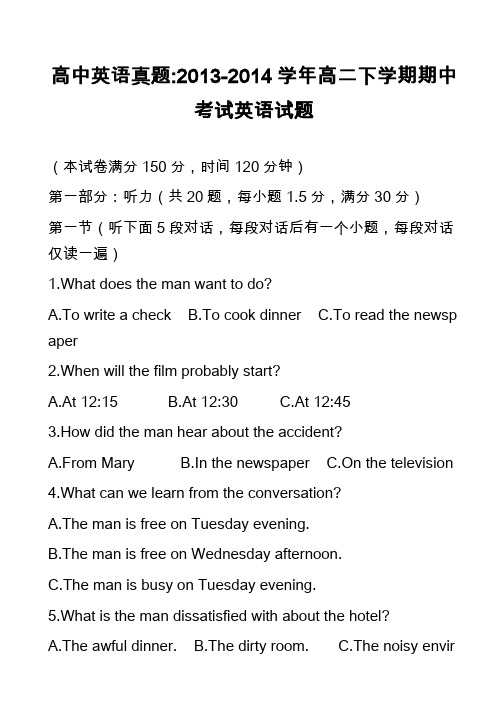
高中英语真题:2013-2014学年高二下学期期中考试英语试题(本试卷满分150分,时间120分钟)第一部分:听力(共20题,每小题1.5分,满分30分)第一节(听下面5段对话,每段对话后有一个小题,每段对话仅读一遍)1.What does the man want to do?A.To write a checkB.To cook dinnerC.To read the newsp aper2.When will the film probably start?A.At 12:15B.At 12:30C.At 12:453.How did the man hear about the accident?A.From MaryB.In the newspaperC.On the television4.What can we learn from the conversation?A.The man is free on Tuesday evening.B.The man is free on Wednesday afternoon.C.The man is busy on Tuesday evening.5.What is the man dissatisfied with about the hotel?A.The awful dinner.B.The dirty room.C.The noisy environment.第二节(每段对话或独白读两遍)听下面一段对话,回答第6和第7两个小题。
6.How many times a day should the man take the medicine?A.TwiceB.Three timesC.Four times7.What shouldn’t the man do these days?A.SmokeB.Drink wine D.Overwork听下面一段对话,回答第8和第9两个小题。
高中英语真题-2014届高三第二次联考

高中英语真题:2014届高三第二次联考第一部分听力(满分30分)第一节(共5小题;每小题1.5分,满分7.5分)听下面5段对话。
每段对话后有一个小题,从题中所给的A、B、C三个选项中选出最佳选项,并标在试卷的相应位置。
听完每段对话后,你都有10秒钟的时间来回答有关小题和阅读下一小题。
每段对话仅读一遍。
1. How much should a student pay if he rents the room for two weeks?A. $25.B. $40.C. $50.2. What does the man mean?A. He doesn’t know well.B. He has never been to .C. He doesn’t want to talk to the woman.3. Where does the conversation most probably take place?A. In a school.B. In a shop.C. In a restaurant.4. What’s the probable relationship between the speakers?A. Neighbors.B. Doctor and patient.C. Boss and secretary.5. What can we know about the man?A. He is still a student.B. He wants to be a lawyer.C. He runs a law office.第二节(共15小题;每小题1.5分,满分22.5分)请听下面5段对话或独白,选出最佳选项。
请听第6段材料,回答第6至7题。
6. What kind of music does the man like best?A. Classical music.B. Rock music.C. Ja zz.7. What does the man advise the woman to do?A. Come to his house this weekend.B. Hold a party in her house.C. Take the violin course with him.请听第7段材料,回答第8至10题。
2014学年高一下学期期中考试英语试卷Word版含答案
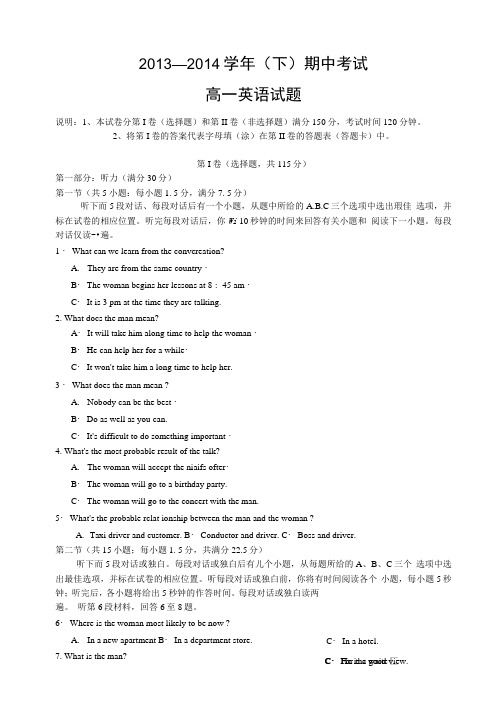
2013—2014学年(下)期中考试高一英语试题说明:1、本试卷分第I卷(选择题)和第II卷(非选择题)满分150分,考试时间120 分钟。
2、将笫I卷的答案代表字母填(涂)在第II卷的答题表(答题卡)中。
第I卷(选择题,共115分)第一部分:听力(满分30分)第一节(共5小题:每小题1. 5分,满分7. 5分)听下而5段对话、每段对话后有一个小题,从题中所给的A.B.C三个选项中选出瑕佳选项,并标在试卷的相应位置。
听完毎段对话后,你Wi 10秒钟的时间来回答有关小題和阅读下一小题。
每段对话仅读-•遍。
1 ・ What can wc learn from the convcreation?A.They are from the same country ・B・ The woman begins her lessons at 8: 45 am ・C・ It is 3 pm at the time they are talking.2. What docs the man mean?A・ It will take him along time to help the woman ・B・ He can help her for a while・C・ It won't take him a long time to help her.3 ・ What does the man mean ?A.Nobody can be the best ・B・ Do as well as you can.C・ It's difficult to do something important ・4. What's the most probable result of the talk?A.The woman will accept the niaifs ofter・B・ The woman will go to a birthday party.C・ The woman will go to the concert with the man.5・ What's the probable rclat ionship between the man and the woman ?A.Taxi driver and customer. B・ Conductor and driver. C・ Boss and driver.第二节(共15小题;每小题1. 5分,共满分22.5分)听下而5段对话或独白。
高中英语真题-高2014级高一下期半期考试
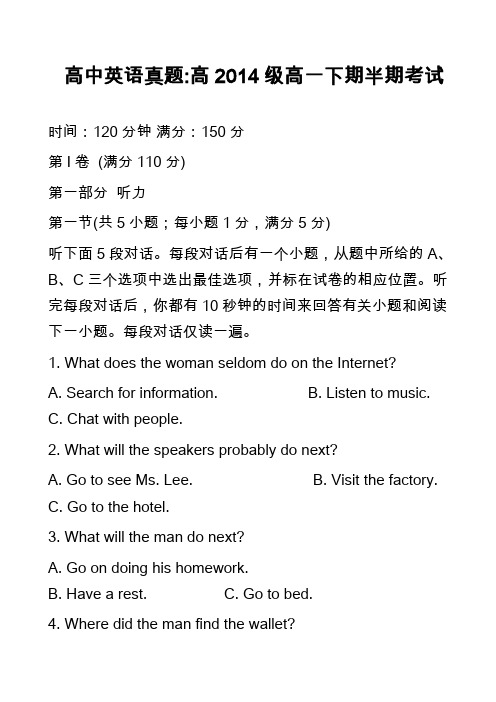
高中英语真题:高2014级高一下期半期考试时间:120分钟满分:150分第I卷 (满分110分)第一部分听力第一节(共5小题;每小题1分,满分5分)听下面5段对话。
每段对话后有一个小题,从题中所给的A、B、C三个选项中选出最佳选项,并标在试卷的相应位置。
听完每段对话后,你都有10秒钟的时间来回答有关小题和阅读下一小题。
每段对话仅读一遍。
1. What does the woman seldom do on the Internet?A. Search for information.B. Listen to music.C. Chat with people.2. What will the speakers probably do next?A. Go to see Ms. Lee.B. Visit the factory.C. Go to the hotel.3. What will the man do next?A. Go on doing his homework.B. Have a rest.C. Go to bed.4. Where did the man find the wallet?A. In the parking lot.B. In the supermarket.C. On the grass.5. Where does the conversation probably take place?A. In a shopping mall.B. In an office building.C. In a concert hall.第二节(共15小题;每小题1分,满分15分)听下面5段对话或独白。
每段对话或独白后有几个小题,从题中所给的A、B、C三个选项中选出最佳选项,并标在试卷的相应位置。
听每段对话或独白前,你将有时间阅读各个小题,每小题5秒钟;听完后,各小题给出5秒钟的作答时间。
2014年下期高三对口升学英语考试试题
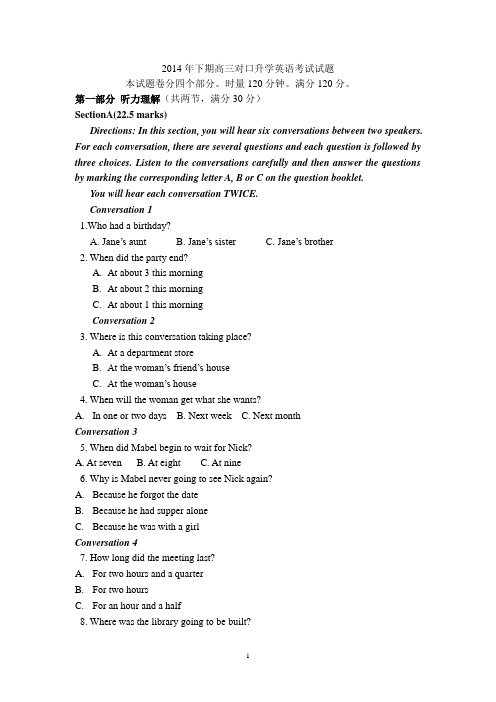
2014年下期高三对口升学英语考试试题本试题卷分四个部分。
时量120分钟。
满分120分。
第一部分听力理解(共两节,满分30分)SectionA(22.5 marks)Directions: In this section, you will hear six conversations between two speakers. For each conversation, there are several questions and each question is followed by three choices. Listen to the conversations carefully and then answer the questions by marking the corresponding letter A, B or C on the question booklet.You will hear each conversation TWICE.Conversation 11.Who had a birthday?A. Jane’s auntB. Jane’s sisterC. Jane’s brother2. When did the party end?A.At about 3 this morningB.At about 2 this morningC.At about 1 this morningConversation 23. Where is this conversation taking place?A.At a department storeB.At the woman’s friend’s houseC.At the woman’s house4. When will the woman get what she wants?A.In one or two daysB. Next weekC. Next monthConversation 35. When did Mabel begin to wait for Nick?A. At sevenB. At eightC. At nine6. Why is Mabel never going to see Nick again?A.Because he forgot the dateB.Because he had supper aloneC.Because he was with a girlConversation 47. How long did the meeting last?A.For two hours and a quarterB.For two hoursC.For an hour and a half8. Where was the library going to be built?A. In a townB. In a collegeC. In a middle school9. Who wanted the young man to attend the meeting?A. The girlB. His friendC. EdwardConversation 510. Where does this conversation take place?A. At a department storeB. At the cinemaC. At home11. What program does the man like?A. Football gamesB. TV filmsC. News12. What is the woman going to do when the man does not agree with her?A.She is going to turn off the TVB.She is going to bedC.She is going to buy another TV setConversation 613. What’s the probable relationship between the womanand the man?A.ClassmatesB. Students from different collegesC. Friends14. Where does the man meet the woman?A.Near the college where the woman studiesB.In the shop where the man worksC.In the college where the woman studies15. How long does the woman stay in the college every day?A. 9 hoursB. 7 hoursC. 6 hoursSection B(7.5 marks)Directions: In this section, you will hear a mini-talk.Listen carefully and then fill in the numbered blanks with the information you’ve got. Fill in each blank with no more than 3 words. You will hear the mini-talk TWICE.第二部分知识运用(共三节,满分40分)第一节词汇与语法(本节共10小题,每小题1分,共10分)从每小题給出的ABCD四个选项中选出一项符合题意的最佳选项,并将答案填在答题卡上。
四川省内江市安岳县兴隆中学高一英语联考试卷含解析
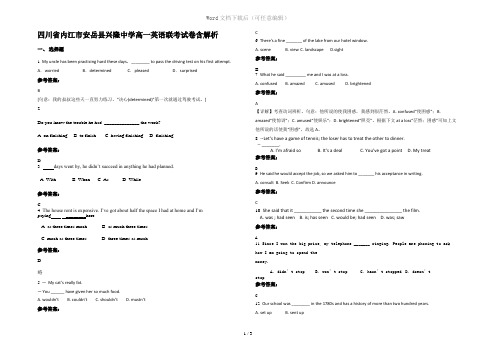
四川省内江市安岳县兴隆中学高一英语联考试卷含解析一、选择题1. My uncle has been practicing hard these days,________ to pass the driving test on his first attempt. A.worried B.determined C.pleased D.surprised参考答案:B[句意:我的叔叔这些天一直努力练习,“决心(determined)”第一次就通过驾驶考试。
]2.Do you know the trouble he had ______________ the work?A. on finishingB. to finishC. having finishingD. finishing参考答案:D3. days went by, he didn’t succeed in anything he had planned.A. WithB. WhenC. AsD. While参考答案:C4. The house rent is expensive. I’ve got about half the space I had at home and I’mpaying ________here.A. as three times muchB. as much three timesC. much as three timesD. three times as much参考答案:D略5. —My cat’s really fat.— You ______ have given her so much food.A. wouldn’tB. couldn’tC. shouldn’tD. mustn’t参考答案:C6. There's a fine _______ of the lake from our hotel window.A. sceneB. viewC. landscapeD.sight参考答案:B7. What he said _________ me and I was at a loss.A. confusedB. amazedC. amusedD. brightened参考答案:A【详解】考查动词辨析。
四川省巴中市兴隆中学高一英语上学期期末试题含解析
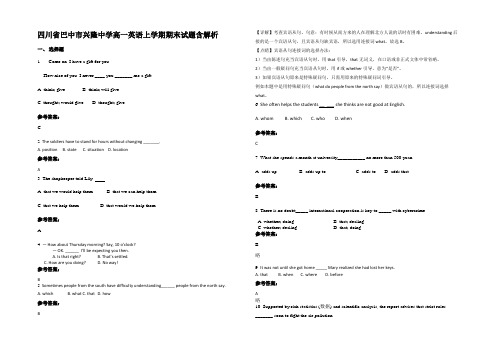
四川省巴中市兴隆中学高一英语上学期期末试题含解析一、选择题1. --- Come on. I have a gift for you.--- How nice of you. I never ____ you _______ me a gift.A. think; giveB. think; will giveC. thought; would giveD. thought; give参考答案:C2. The soldiers have to stand for hours without changing _______.A. positionB. stateC. situationD. location参考答案:A3. The shopkeeper told Lily .A. that we would help themB. that we can help themC. that we help themD. that would we help them参考答案:A4. —How about Thursday morning? Say, 10 o’clock?— OK. ______ I’ll be expecting you then.A. Is that right?B. That’s settled.C. How are you doing?D. No way!参考答案:B5. Sometimes people from the south have difficulty understanding______ people from the north say.A. whichB. whatC. thatD. how参考答案:B 【详解】考查宾语从句。
句意:有时候从南方来的人在理解北方人说的话时有困难。
understanding后接的是一个宾语从句,且宾语从句缺宾语,所以选用连接词what。
- 1、下载文档前请自行甄别文档内容的完整性,平台不提供额外的编辑、内容补充、找答案等附加服务。
- 2、"仅部分预览"的文档,不可在线预览部分如存在完整性等问题,可反馈申请退款(可完整预览的文档不适用该条件!)。
- 3、如文档侵犯您的权益,请联系客服反馈,我们会尽快为您处理(人工客服工作时间:9:00-18:30)。
兴隆中学高2014级半期考试英语试题考试时间:120分钟;满分:150分第一节:听力(共20个小题;每小题1.5分,满分30分)第二节:语法和词汇知识(共15小题;每小题1分,满分15分)21、The film is so _________ that all the children like it.A interestB interestsC interestingD interested22、The boys often play_______football in _________ afternoon.A / , anB the ,anC / , theD a , the23、---Jia Ning admitted ______ to us this morning.---That’s nothing. Tell him to avoid ______ lies.A. lying; tellingB. to lie; tellingC. lying; to tellD. to lie; to tell24、—Have you considered ______ the job as a teacher?—Yes. I like it because a teacher is often considered __ a gardener.A. to take; to beB. to take; beingC. taking; beingD. taking; to be25、______ our National Day coming near, many celebrations are in preparation.A. AsB. BeforeC. WithD. After26、—Whose advice do you think I should take?—______.A. It’s up to youB. You speakC. That’s itD. You got it27、The foreigner made a deep ____ on me. I’ll keep it in my mind all my life.A. impressionB. opinionC. thoughtD. idea28、—I’ve just been to my first language class.— Oh really? ________ . Which language are you studying?A. So do IB. So have IC. So I doD. So I have29、I don’t think you will be bored in Ms White’s class,__________?A. do youB. will youC. don’t youD. won’t you30、This room is ______ that one. Which of the following is wrong?A. three times so bigger asB. three times the size ofC. three times bigger thanD. three times as big as31、The nearest bus stop is 10 miles _________ our school.A. far fromB. far away fromC. far awayD. away from32、_____ great fun it is to swim on such a hot day!A. WhatB. What aC. HowD. How a33、---Shall we go skating or stay at home?----which ______ do yourself?A. do you ratherB. would you ratherC. will you ratherD. should you rather34、Rather than ____ on a crowded bus, he always prefers _____ a bike.A. ride; rideB. riding; rideC. ride; to rideD. to ride; riding35、My first impression ___Mrs Zhang was that she was nervous and shy.A.For B. on C. of D. by第三节:完形填空(共20小题;每小题1.5分,共30分)It was my birthday last Thursday. I decided to 36 by inviting a few friends out to supper. I chose a restaurant in a 37 part of town. It is one of my favorite restaurants because the food is good and the waiters are friendly. It is 38 ever crowded, because not many people know about it, so it is not usually 39 to book a table. In any case, Thursday is not a busy evening 40 .When we entered the restaurant, we were surprised to find it completely 41 . I looked around but not 42 table was free. One of the waiters recognized me. He came across and explained the situation. "A party of tourists came in about half an hour ago.” he said. "It was like an invasion(侵略). Suddenly the place was full! We can hardly 43 " The waiter then pointed to a table in the corner. "The people there are about to 44 " he said, "Just hold on and you'll _45 a place there." He was right. Fifteen minutes later, the people 46 the corner table paid their 47 , got up and left. I led my friends across and we all sat down.48 our table was almost out of sight. We tried to call the attention of the waiter 49 sent us there, but he, like all the other waiters, 50 the party of tourism. They ordered lots of food. At last, an hour later, the tourists were finishing their meal and looking very 51 with life. The waiter now very tired, appeared at our table. I advised my friends about the best dishes and finally the waiter went off with our 52A few moments later he returned to our table. We could tell from his face that he had 53 for us. 54 a little sorry he told us that there was 55 left. "All we can offer you" he said, "is an omelet(煎蛋卷) !"36. A. remember B. celebrate C. memorize D. congratulate37. A. quiet B. calm C. busy D. silent38. A. hard B. often C. hardly D. always39. A. necessary B. possible C. important D. certain40. A. as before B. as a matter of fact C. as usual D. as is known to all41. A. empty B. full C. free D. quiet42. A. all B. an empty C. a single D. a double43. A. watch B. look after C. try D. manage44. A. start B. leave C. end D. pay45. A. find B. find out C. wait D. see46. A. by B. beside C. at D. near47. A money B. bill C. food D. drinks48. A. Luckily B. Fortunately C. Generally D. Unluckily49. A. whom B. which C. he D. who50. A. were kept busy B. was busy with C. kept busy with D. were busy with51. A. exciting B. tired C. pleased D. disappointed52. A. dishes B. food C. order D. menu53. A. good presents B. good news C. bad news D. bad presents54. A. Looking B. Seeing C. Looked D. Found55. A. no meat or fish B. no meat and fish C. meat and fish D. not meat and fish第四节:阅读理解(共20小题;每小题2分。
